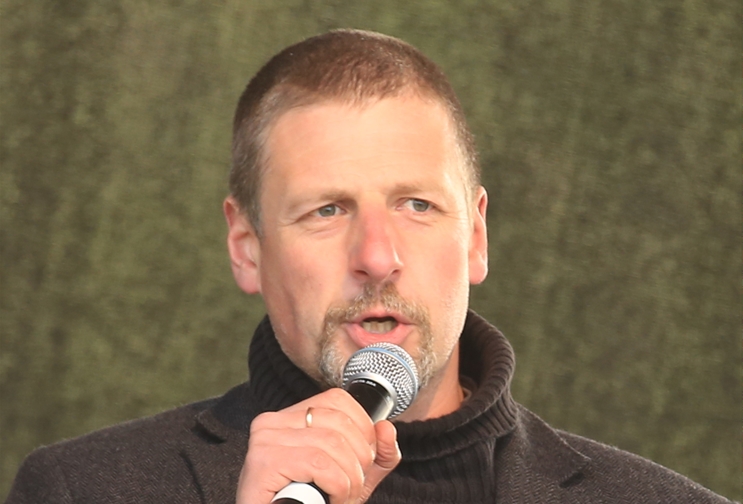Finis Germania is a posthumous collection of melancholy writing by German ecologist and sometime academic Rolf Peter Sieferle, who took his own life in despair in 2016. Sieferle regreted the disappearance of a recognizably Western civilization and deplored the likely ecological effects of a European continent thrown open to almost unrestricted Third World immigration.
The book’s publisher, Götz Kubitschek, has been recently declared a “right wing extremist” by the German Federal Office for the Protection of the Constitution (BfV), and his publishing house, Antaios, has been smeared as a far-right propaganda publisher. Kubitschek’s heroic efforts to reach the German public with Sieferle’s work produced an underground bestseller, despite the decision of Germany’s antifascist government and its even more antifascist national media to tar Finis Germania with a fascist brush.
There is nothing fascist or neo-Nazi about Sieferle’s writings or his thoughts about Germany’s immigration problems. In fact, in assessing Germany’s situation, Sieferle shows a more advanced example of the same trend that is going on here in America.
The enthusiastic reception of millions of barely identified “migrants” into Germany was the established practice under the government of Angela Merkel. Unfortunately, the recent replacement of Merkel’s rule by an even more woke Green Social Democracy coalition will undoubtedly accelerate immigration trends. It will also result in Germany’s internal secret police service, the Bundesamt für Verfassungsschutz (BfV) (Federal Office for the Protection of the Constitution), going on a binge of investigating lots more German citizens as extremists and threats to the country’s democratic system. Of course, the present German regime is only technically “democratic.” In reality, it is a grotesque antifascist dictatorship that is explicitly and unapologetically anti-German.
Germany’s president, Frank-Walter Steinmeier, was recently elected to a second term by the German parliament. Steinmeier’s forte, as far as I can determine, is trashing his country and its people everywhere on the planet. In his speeches, Steinmeier heaps attacks on his countrymen for having unilaterally unleashed every major European war during the last 150 years. It also seems, according to Steinmeier, that anti-Semitism is as much a threat now in Germany as it was when the Nazis were sending Jews to concentration camps. If Germans do suffer from Sündenstolz (a tendency to revel in listing their sins), Steinmeier embodies that masochistic spirit, even if he habitually places himself above his sinful nation.
Recently this crusader for democracy gave an inauguration address in which he declared himself the friend of all democrats, not someone who will tolerate the enemies of democracy. From the context, it was clear that Steinmeier was designating as his antidemocratic foe whoever opposed the COVID mandates and mask-wearing imposed on Germany’s population. Any disagreement with this self-appointed custodian of the cult of democracy, it would appear, constitutes an antidemocratic act.
On the 150th anniversary of the founding of Germany as a unified nation-state, Steinmeier made a sharp distinction between Germany and other European nations. While other countries presumably enjoy peaceful founding rituals, the Germans forged their nationhood through conflict (Kriegsgründung). This made Germany’s founding something we should not be celebrating but loudly lamenting as a catastrophe.
One wonders whether Herr Präsident ever studied the history of any country but his own and whether he undertook the study of German history with anyone but raging Germanophobes. Almost every nation-state, including the American republic, was established through a clash of arms. In that respect, Germany’s founding was no different from that of other European countries; and it was quite similar to that of Italy, which was formed about the same time after a series of military actions.
The kind of tirades that Canadian Prime Minister Justin Trudeau recently unleashed on striking Canadian truckers is the everyday rhetoric employed by German government leaders as they tear into those who disagree with them. Those who object to what the leftist German regime is doing may end up being more than just a rhetorical punching bag. They may also be spied on by the BfV and then prosecuted as a danger to the German democratic order.
If the critic is a public employee, he may also lose his post. A German former public servant, Martin Wagener, fired for his undemocratic candor, wrote a detailed account of how the BfV has gone rogue in the last quarter of the 20th century. In Kulturkampf um das Volk (“The People’s Culture War”), Wagener writes how BfV President Thomas Haldenwang has corrupted the bureau into a political instrument in the hands of the woke left. Although the BfV has followed the same general path as American surveillance agencies, it is even better positioned to defame and professionally destroy those whom government leaders target.
Ever since Merkel’s accession to power, a continuing objective in Germany has been the “struggle against the right,” a crusade which the federal government generously finances and which Haldenwang in his politically slanted investigations steadily assists. Wagener shows how this crusade can count on the combined assistance of the BfV, multiple LGBT organizations, pro-immigration pressure groups, and the national media. Not surprisingly, this campaign rarely confronts right-wing terrorists. The mission is weaponized, rather, against any group or political leader who is more patriotic than Germany’s antinational political leaders and/or whose presence annoys them. Any German who describes himself as wanting to preserve his nation, expresses reservations about gay marriage, fails to support COVID restrictions, or questions the official anti-German narrative about its national past may run into the government’s crosshairs.
The only party that has frontally challenged this arrangement is the Alternative für Deutschland (AfD). An outcast party, the AfD has positioned itself programmatically where the Christian Democrats used to be, about 50 years ago. Anyone known to belong to this party or suspected of voting for it may be removed from an academic post or from the state bureaucracy. The BfV investigates members of the AfD as extremists, with far more thoroughness than it typically uses in cases of Islamist violence. No other national party will even deal with the ostracized AfD.
The situation in Germany is far more hopeless than that of North America, which still has a large vocal opposition to the leftist ruling class; the Germans don’t. Sieferle might have been correct when he concluded there was no way back from the abyss toward which Germany was rushing. His somber predictions include a scene from Berlin as he pictured the German capital 200 years hence. Indigenous Germans are no longer found there because they failed to reproduce. Instead, rival Muslim gangs, whose ancestors had been Third World migrants, fight over war zones. Friend-enemy relations survived but no longer include white Europeans, who have disappeared, leaving the field open to more virile and prolific ethnicities. Berlin and the rest of Germany have sunk into ecological ruin, since their new inhabitants don’t care about preserving the environment.
No wonder these frightening pictures of what lay ahead for his country and the rest of Western Europe drove Sieferle to despair.

For two obvious reasons the Germans will have problems avoiding the future Sieferle envisions. One, antifascist indoctrination is more ingrained among Germans than among the citizens of most other Western countries. This mindset began with the Allied occupation after World War II and was advanced through strenuous efforts to reconstruct the national psyche. During the early phases of the Cold War, particularly under the guidance of Germany’s first postwar chancellor, Konrad Adenauer, the theme of “overcoming the German past”—which meant the Nazi, or fascist, past—was broadened to include “totalitarian” threats to the democratic constitutional order.
Under German Basic Law, introduced in 1949 and written under close Allied supervision, it became the duty of German citizens, once they were democratically reeducated, to protect human rights for the sake of humanity, while special agencies like the BfV were created to oppose threats to German democracy.
In the early years of the Federal Republic, the designated enemy was totalitarianism, which pertained to Soviet agents and pro-Communist “antifascists” as well as neo-Nazis. After the Sixty-Eighters rose to power, and after the German government’s leftward lurch in the early 1970s, antifascism replaced anti-totalitarianism as the German state religion. This designation of the universal enemy has remained since then. By the time Merkel, a former East German Communist with fervent Communist parents, arrived at the chancellorship as a Christian Democrat, significant opposition to the government’s leftward march was waning. Already in 1998, onetime antifascist terrorist leader Joschka Fischer became German foreign minister and later vice-chancellor. Fischer’s past career as a bomb-throwing radical hardly caused waves in Germany or in the international media.
More recently, the current woke coalition appointed as minister of the interior Nancy Faeser, who, just before her appointment, published an incendiary tear in the appropriately named magazine Antifa. Quite predictably, the international media attributed this “rumor” to the “far-right weekly” Junge Freiheit, which broke the story. In an interview with the newspaper’s editor, I made the point that after Joschka Fischer turned his bomb-throwing past into political success, there was no way that Faeser would not benefit from her far-left association. Germans have moved beyond the double standard that we complain about in this country. There is only one standard among them. Violence and terrorism are fine, providing they come from self-described antifascists.
Two, the German antifascist left, which has moved into a particularly self-destructive form of wokeness, has not encountered critical resistance because most Germans happily embrace it. And this may be the main difference between what we’re seeing in America, or even in Canada, and what is occurring in Germany. In the recent German federal elections, most of the votes went to the woke, antifascist left. The only parties that even by our present minimal standards could be regarded as conservative, the Freidemokraten and the AfD, gained less than 22 percent of the vote. And since the last federal election in 2017, Merkel’s CDU/CSU union lost 8.8 percentage points to parties further to the left.
Even though it was clear at the time that government agencies were bearing down hard on groups that were perceived as “nationalist” or vocally unhappy about the extensive lockdowns, when the election came, the Germans voted for more of the same, served up by a more extreme antifascist left. It’s not as if the voters had no choice. In the privacy of the voting booth, they could have opted for the only party that would have tried to end the drift into leftist totalitarianism. They also could have voted to approach the abyss more slowly, at the speed of the previous administration.
But most Germans, being Germans, are profoundly conformist, and chose to put themselves even more closely in sync with woke opinion. Although Germany’s intellectual right, whose members have suffered grievously for their convictions, does possess a more serious and more principled conservatism than that now prevalent in America, it also has no power and its influence is severely restricted.
Only last week I discovered an illuminating book on antifascism by the distinguished German historian Antonia Grunenberg, Antifaschismus: ein deutscher Mythos (“Antifascism: a German Myth”). Her book clarifies the links between the invention of the word “antifascism” and the history of postwar Germany. She traces how the present concept developed from the East German Communist manipulation of the operative term, underscoring how deeply German thinking was marked by the Communist left.
I’m relieved to learn that another historian writing in the early 1990s was as struck as I still am by this morbid German fixation. Still, no matter how much an earlier antifascism was made to serve an unpleasant dictatorship, antifascism’s woke version may be socially even more pernicious. It combines Marxist-Leninist coercion with a war on human nature. What’s more, it’s now arrived in our living space here in America.
German book publisher Götz Kubitschek (via Wikimedia CC BY-SA 2.0)



Leave a Reply